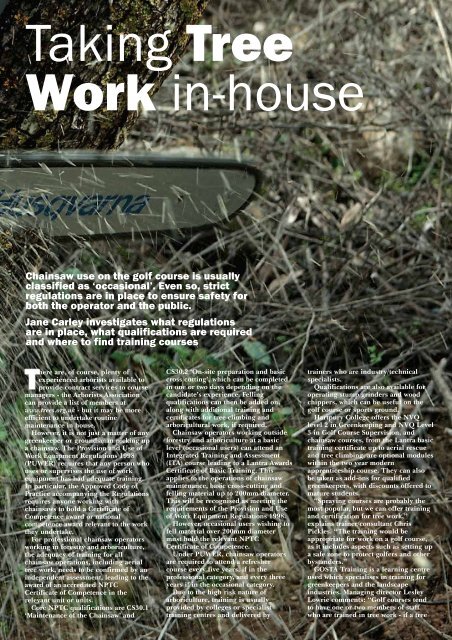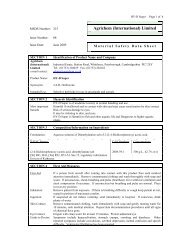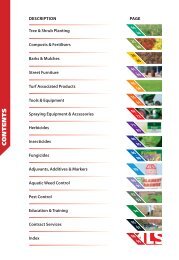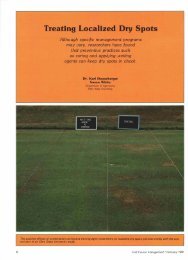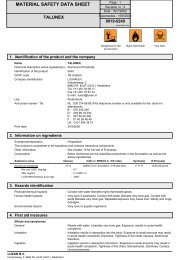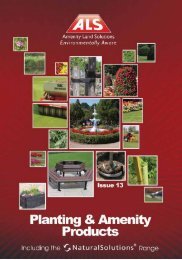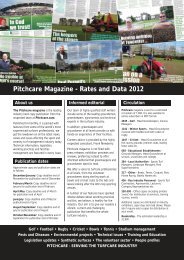Earning his Spurs - Pitchcare
Earning his Spurs - Pitchcare
Earning his Spurs - Pitchcare
Create successful ePaper yourself
Turn your PDF publications into a flip-book with our unique Google optimized e-Paper software.
Taking Tree<br />
Work in-house<br />
Chainsaw use on the golf course is usually<br />
classified as ‘occasional’. Even so, strict<br />
regulations are in place to ensure safety for<br />
both the operator and the public.<br />
Jane Carley investigates what regulations<br />
are in place, what qualifications are required<br />
and where to find training courses<br />
There are, of course, plenty of<br />
experienced arborists available to<br />
provide contract services to course<br />
managers - the Arborists Association<br />
can provide a list of members at<br />
www.trees.org.uk - but it may be more<br />
efficient to undertake routine<br />
maintenance in house.<br />
However, it is not just a matter of any<br />
greenkeeper or groundsman picking up<br />
a chainsaw. The Provision and Use of<br />
Work Equipment Regulations 1998<br />
(PUWER) requires that any person who<br />
uses or supervises the use of work<br />
equipment has had adequate training.<br />
In particular, the Approved Code of<br />
Practice accompanying the Regulations<br />
requires anyone working with<br />
chainsaws to hold a Certificate of<br />
Competence award or national<br />
competence award relevant to the work<br />
they undertake.<br />
For professional chainsaw operators<br />
working in forestry and arboriculture,<br />
the adequacy of training for all<br />
chainsaw operations, including aerial<br />
tree work, needs to be confirmed by an<br />
independent assessment, leading to the<br />
award of an accredited NPTC<br />
Certificate of Competence in the<br />
relevant unit or units.<br />
Core NPTC qualifications are CS30.1<br />
‘Maintenance of the Chainsaw’ and<br />
CS30.2 ‘On-site preparation and basic<br />
cross cutting’, which can be completed<br />
in one or two days depending on the<br />
candidate’s experience. Felling<br />
qualifications can then be added on,<br />
along with additional training and<br />
certificates for tree climbing and<br />
arboricultural work, if required.<br />
Chainsaw operators working outside<br />
forestry and arboriculture at a basic<br />
level (occasional users) can attend an<br />
Integrated Training and Assessment<br />
(ITA) course leading to a Lantra Awards<br />
Certificate of Basic Training. T<strong>his</strong><br />
applies to the operations of chainsaw<br />
maintenance, basic cross-cutting and<br />
felling material up to 200mm diameter.<br />
T<strong>his</strong> will be recognised as meeting the<br />
requirements of the Provision and Use<br />
of Work Equipment Regulations 1998.<br />
However, occasional users wishing to<br />
fell material over 200mm diameter<br />
must hold the relevant NPTC<br />
Certificate of Competence.<br />
Under PUWER, chainsaw operators<br />
are required to attend a refresher<br />
course every five years, if in the<br />
professional category, and every three<br />
years if in the occasional category.<br />
Due to the high risk nature of<br />
arboriculture, training is usually<br />
provided by colleges or specialist<br />
training centres and delivered by<br />
trainers who are industry/technical<br />
specialists.<br />
Qualifications are also available for<br />
operating stump grinders and wood<br />
chippers, which can be useful on the<br />
golf course or sports ground.<br />
Hartpury College offers the NVQ<br />
level 2 in Greenkeeping and NVQ Level<br />
3 in Golf Course Supervision, and<br />
chainsaw courses, from the Lantra basic<br />
training certificate up to aerial rescue<br />
and tree climbing, are optional modules<br />
within the two year modern<br />
apprenticeship course. They can also<br />
be taken as add-ons for qualified<br />
greenkeepers, with discounts offered to<br />
mature students.<br />
“Spraying courses are probably the<br />
most popular, but we can offer training<br />
and certification for tree work,”<br />
explains trainer/consultant Chris<br />
Pickles. “The training would be<br />
appropriate for work on a golf course,<br />
as it includes aspects such as setting up<br />
a safe zone to protect golfers and other<br />
bystanders.”<br />
GOSTA Training is a learning centre<br />
used which specialises in training for<br />
greenkeepers and the landscape<br />
industries. Managing director Lesley<br />
Lowrie comments: “Golf courses tend<br />
to have one or two members of staff<br />
who are trained in tree work - if a tree


